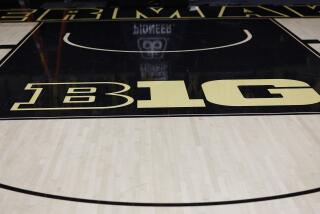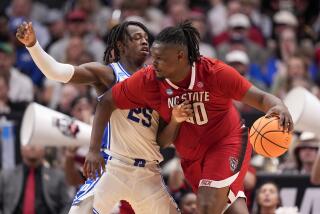COLLEGE BASKETBALL : Harrick’s Sideline Demeanor Mirrored Players’ Attitude
Jim Harrick-bashers are having a grand time these days, what with UCLA’s uninspired performance against Indiana in the West Regional final.
In some regards, the critics have a point. Harrick looked so tight that it appeared he was going to squeeze the ink out of that rolled up piece of paper he holds in hand during games. The Bruins, who couldn’t help but recognize the body language of their coach, played even tighter.
Yes, Harrick’s failure to call timeouts during several of the Hoosiers’ early scoring runs was questionable. Yes, you knew Indiana Coach Bob Knight would have his team prepared to face UCLA, especially after Harrick, in search of a pay raise at the time, popped off about beating the Hoosiers in the Tip-Off Classic in November. Knight remembers that type of thing.
Still, to blame Harrick for this loss is to forget three factors:
Barring a minor miracle, Indiana was going to beat UCLA, no matter how relaxed Harrick acted on the sideline. Indiana had already beaten two difficult opponents, Louisiana State and Florida State, in advancing to the final eight. UCLA, on the other hand, struggled at times against Robert Morris and New Mexico State.
Forget November. Knight was still doing reconstructive surgery on his starting lineup, while UCLA’s was nearly written in stone. Also, freshman Alan Henderson was making his Indiana debut when the teams met in Springfield, Mass. Four months later, the improvement in Henderson’s play is obvious.
At some point, the players themselves have to be held accountable. Don MacLean, a senior, spent much of his time throwing elbows and shooting bricks. Darrick Martin, another senior, added little off the bench. Tracy Murray, a junior, played as if defense was a foreign concept. Mitchell Butler, another junior: zero points, five fouls.
Only senior Gerald Madkins is excused from criticism. He played hard enough the entire game to later earn compliments from the hard-to-please Knight. Too bad the rest of the Bruins didn’t follow Madkins’ lead.
The next time the NCAA starts talking about the integrity of the game and its commitment to the student-athlete, simply remember the starting time of Friday’s Southeast Regional semifinal between Oklahoma State and Michigan at Rupp Arena: 10:20 p.m.
The game ended shortly before 1 a.m. in Lexington, which means the Wolverines and Cowboys probably became the first teams to play in the NCAA tournament and violate curfew at the same time. By the time the players finished their postgame interviews, showered, dressed and returned to their hotels, it was close to 2 o’clock.
As usual, the NCAA agreed to CBS’s request for the later starting time. Pay $1 billion for the television rights, as CBS did, and you expect to get your way. But this time the NCAA Men’s Basketball Committee, which approved the 18-minute change, should have used common sense and said enough was enough.
Mum’s the word at USC, where George Raveling is declining to answer questions about his coaching future. Raveling did say he will choose between coaching and becoming head of the National Assn. of Basketball Coaches after his return from the Final Four. For what it is worth, Raveling’s Monday schedule included lunch with his assistants. The topic? Recruiting. . . .
Five teams to be feared next season: Georgia Tech, Memphis State, North Carolina, Indiana and, of course, Michigan. Here’s why:
Freshmen Travis Best and James Forrest helped get the Yellow Jackets, who lose only center Matt Geiger to graduation, to the final eight.
As long as Anfernee Hardaway and David Vaughn are on the roster, Memphis State will be a national power.
Dean Smith will miss scoring guard Hubert Davis, but the continuing development of Tar Heel center Eric Montross will help ease the hurt.
The Hoosiers lose only one key player, forward-center Eric Anderson. Damon Bailey, Calbert Cheaney and future star Alan Henderson return.
Michigan? Well, put it this way: Coach Steve Fisher sleeps well at night.
Our recently completed ballot for the John R. Wooden Award: 10. LaPhonso Ellis, Notre Dame; 9. Malik Sealy, St. John’s; 8. Todd Day, Arkansas; 7. Walt Williams, Maryland; 6. Alonzo Mourning, Georgetown; 5. Adam Keefe, Stanford; 4. Harold Miner, USC; 3. Shaquille O’Neal, LSU; 2. Jim Jackson, Ohio State, and 1. Christian Laettner, Duke. The names of the top 10 vote-getters will be made public during Wednesday’s ESPN Up Close show with Roy Firestone. The winner will be announced April 8 at the Los Angeles Athletic Club.
Leftovers from the greatest NCAA tournament game we’ve ever seen, Duke’s 104-103 overtime victory over Kentucky in the East Regional final:
Kentucky Coach Rick Pitino spent nearly 15 minutes after the game talking to his disconsolate team. As several players fought back tears, Pitino reminded the Wildcats how far the once-disgraced program has come since NCAA sanctions were imposed in 1989. “We are not losers,” Pitino told reporters. “I told the guys, ‘Don’t let two seconds (the time it took for Laettner’s winning shot) determine your basketball life because it’s worth a lot more than that.’ And I took out an article, a front-page story from Sports Illustrated three years ago that said, ‘Kentucky’s Shame.’ From three years ago to now, I couldn’t be any more proud of a basketball team.”
Pitino said he could live with his decision not to put a defender on Duke’s Grant Hill for the final inbounds pass to Laettner. The key play, he said, occurred with 2:41 remaining in overtime and Kentucky ahead, 96-93. That is when Duke’s Bobby Hurley shot a three pointer and missed. But the Blue Devils got the rebound and Hurley got another chance from the three-point line. This time he converted. “That hurt us more than any other part of the game,” Pitino said. And had Kentucky grabbed the rebound? “It probably would have been over at that point.”
Pitino has been second-guessed for not putting a man on Hill and not positioning Kentucky defenders in front of and behind Laettner on the final play. Even Pitino questioned his strategy immediately after the game. But after reviewing tapes, he has said it was the right thing to do. Stick a defender on Hill and you risk an open shot by Hurley or Thomas Hill. Sandwich Laettner with two defenders and you risk a foul, which would have meant two free throws. And what would you rather see: Laettner, an 81.3% free-throw shooter, attempting two from the line, needing only one to tie? Or Laettner attempting a fadeaway 17-footer at the buzzer? Remember, Laettner made 10 of 10 free throws.
Two poignant scenes at game’s end: Duke’s Thomas Hill was so overcome with happiness after watching Laettner’s shot that he started to cry. And then there was Kentucky’s Sean Woods, whose driving bank shot over Laettner’s outstretched hand with 2.2 seconds to play should have been enough to give the Wildcats the upset. Instead, after sprawling on the court in disbelief after Laettner’s jumper, Woods sought out and hugged the Duke center. “Good shot,” Woods said, not needing to say more. “Great game,” Laettner said.
Top 10
As selected by staff writer Gene Wojciechowski
No. Team Record 1. Duke 32-2 2. Indiana 27-6 3. Michigan 24-8 4. Cincinnati 29-4 5. Kentucky 29-7 6. Ohio State 26-6 7. Oklahoma State 28-8 8. Memphis State 23-11 9. Massachusetts 30-5 10. UCLA 28-5
Others: North Carolina (23-10), Seton Hall (23-9), Texas El Paso (27-7), Florida State (22-10), Kansas (28-5).
More to Read
Go beyond the scoreboard
Get the latest on L.A.'s teams in the daily Sports Report newsletter.
You may occasionally receive promotional content from the Los Angeles Times.






